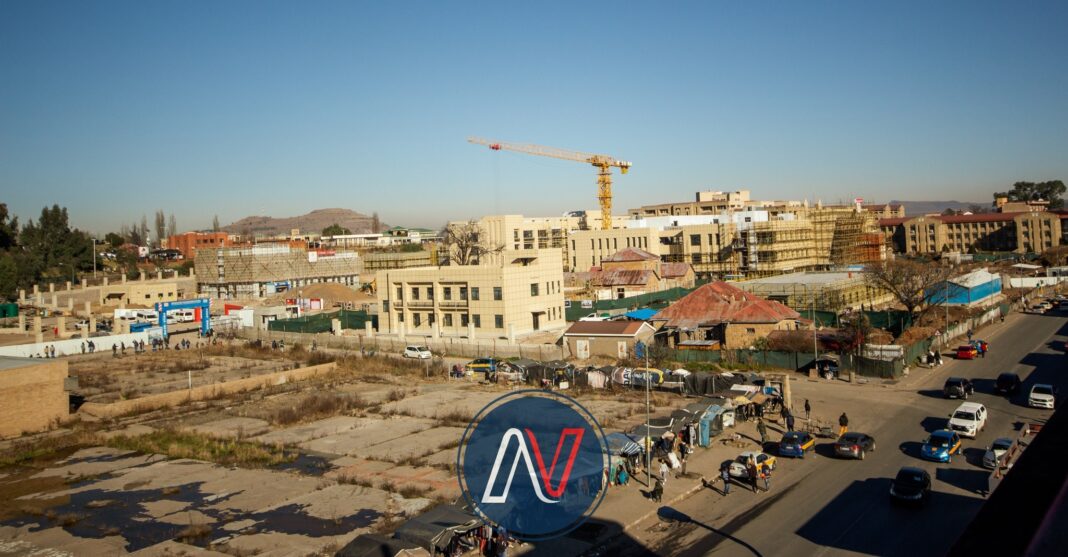Ntsoaki Motaung
The construction of the Maseru District Hospital, situated on the site of the old Queen Elizabeth II Hospital, is nearly finished, bringing hope for improved healthcare services.
The sod-turning ceremony took place in February 2021, and the hospital is expected to be fully operational later this year.
Boasting modern facilities and state-of-the-art medical equipment, the hospital aims to serve Maseru residents and beyond, with specialised services including eye care, cancer treatment, TB, HIV care, and non-communicable disease treatments via telemedicine platforms.
The ambitious project is projected to benefit at least 400,000 people in Maseru and neighboring districts and will house training facilities and dormitories for aspiring doctors and nurses.
High Expectations and Worrying Precedent
Despite the promising prospects of the new hospital, concerns are raised due to the challenging state of Lesotho’s health system and a history of underperformance in healthcare facilities.
The Ministry of Health faces a myriad of challenges, including the long-standing grievances of Basotho doctors. Their demand for fair compensation and call duty allowances remains unmet, leading to a recent strike and concerns over healthcare delivery.
Lesotho Medical Association (LMA) announced in February that doctors would cease taking calls from March 1, citing the nonpayment of these allowances.
The LMA stated that for over five years, doctors in the public sector have been working beyond ordinary hours without any form of remuneration.
Dr. Mojakisane Ramafikeng, president of the LMA, expressed the frustration of doctors, saying: “This includes working during nights, weekends, and public holidays without any form of remuneration.â€
Doctors are required to be on call during specific hours, yet the nonpayment of their call duty allowances has led to a strain on their working conditions and has prompted some to withdraw from taking on additional responsibilities.
In addition to the doctors’ strike, there is a notable shortage of doctors and nurses in the country’s healthcare system. Those who are employed express dissatisfaction with their working conditions, further straining the delivery of quality health services.
Health Sector Expenditure Review Reveals Alarming Ratios
According to the World Bank’s 2017 Public Health Sector Expenditure Review, the doctor-to-population ratio is alarmingly low at 0.9 per 10,000, and for nurse-midwives, the ratio is 10.2 per 10,000.
Both figures fall below the WHO AFRO regional average of 2.6 and 12.0, respectively, significantly impacting the government’s ability to deliver quality health services.
The report also highlighted the skewed allocation of resources and staff in favor of Maseru, leaving underserved districts with limited access to healthcare.
“Allocation of resources and staff is biased in favour of Maseru, and thought should be given to reallocating doctors to underserved districts to ensure patients have sufficient access,†the report read.
It indicated that nurses were more evenly distributed among facilities due to the prevalence of many nurse-staffed primary health centers across Lesotho operated by the government as well as the Christian Health Association of Lesotho (CHAL).
“Staffing needs to be aligned to each facility’s need and patient demand, as the current staffing process leads to both short-staffed, high-volume health centers and over-staffed/under-utilized, low-volume facilities.†the report read.
To ensure the success of the upcoming Maseru District Hospital and overall improvement in the country’s healthcare, Dr. Ramafikeng emphasised the need for the Ministry of Health to address current challenges and create a more promising environment for healthcare professionals and patients alike.
He expressed his hope for improvements in the health system and the potential for Basotho doctors to receive opportunities for specialisation abroad and return home to contribute their expertise.
However, he acknowledged that the current situation presents significant challenges and urged the Ministry of Health to address the prevailing problems.




